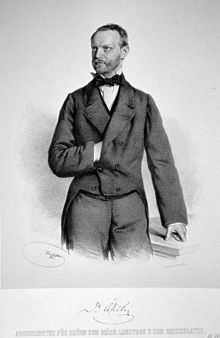Carl Giskra

Carl Giskra (also Karl Giskra) (born January 29, 1820 in Mährisch-Trübau ; † June 1, 1879 in Baden near Vienna ) was a politician of the Austrian Empire and, after 1867, the Austro-Hungarian dual monarchy .
Life
Carl Giskra received his doctorate in philosophy in Vienna in 1840 and a doctorate in law in 1843, and since 1846 supplement to political science at the University of Vienna . In the revolutionary year 1848 /49 And that led the Academic Legion (1848) in Vienna and was a deputy in the National Assembly in Frankfurt . In 1850 he returned to Vienna.
From 1860 he worked as a lawyer in Brno ; from 1861 to 1867 member of the German Liberal Party in the Moravian state parliament, since 1862 also in the Reichsrat. In 1866 Carl Giskra became Mayor of Brno (July 1866 to December 1867) and developed a recognized administrative and organizational activity. The Brno Kaunitz Street, in Czech Kounicova, is called after Wenzel Robert von Kaunitz , 1885-1918 and 1940-1946 also bore his name. In 1867 he became President of the Austrian House of Representatives and was Austrian Minister of the Interior from 1867 to 1870. He mainly carried out the separation of the political administration from the judiciary. In 1867 he advocated the December constitution and the solution of the Concordat ( State Church Treaty ) and was most recently director of the “First Austrian Spar-Casse”.
Selfish involvement in financial corporations is said to have damaged his reputation. In 1873 he was re-elected to the House of Representatives in his constituency in Brno in Moravia .
Carl Giskra was first married to Aloisia Arnstein (* 1815 in Vienna; † 1854 ibid), a step-niece of the writer Benedikt David Arnstein ; the wedding took place in St. Stephen's Cathedral in 1845 . In 1860 he married Elisabeth Zuech, b. Hauschka (* 1825 in Pettau , † 1900 in Vienna). The second marriage came from the son of the same name, Karl (born February 22, 1864 in Brno , † October 24, 1919 in Gersau , Canton Schwyz), who was raised to Baron von Giskra in 1871. As a member of the Austrian diplomatic service, he was Legation Counselor in Washington in 1905, in Sofia in 1910, and in 1914 Austrian Envoy Extraordinary and Minister Plenipotentiary in The Hague. He is said to have challenged Georg von Schönerer to a duel because of a verbal attack on his deceased father .
Carl Giskra died in 1879 in a villa that the family moved into around 1870 in Baden near Vienna at Marchetstrasse 70. He was buried on June 3, 1879 in the nearby St. Helena cemetery.
literature
- Wilhelm Kosch : Biographical State Handbook . Lexicon of Politics, Press and Journalism, Volume 1, 1959.
- Alois Czedik von Bründelsberg and Eysenberg : On the history of the kk Austrian ministries 1861-1916 . Volume 1, 1917, page 92 ff.
- Heribert Sturm : Biographical lexicon on the history of the Bohemian countries . Published on behalf of the Collegium Carolinum , Oldenbourg, Munich 1979, page 440, ISBN 3-486-49491-0 .
- Constantin von Wurzbach : Giskra, Karl . In: Biographisches Lexikon des Kaiserthums Oesterreich . 5th part. Typogr.-literar.-artist publishing house. Establishment (L. C. Zamarski & C. Dittmarsch.), Vienna 1859, p. 199 f. ( Digitized version ).
- Constantin von Wurzbach : Jiskra . In: Biographisches Lexikon des Kaiserthums Oesterreich . 10th part. Kaiserlich-Königliche Hof- und Staatsdruckerei, Vienna 1863, p. 188 ( digitized version ).
- Giskra Karl. In: Austrian Biographical Lexicon 1815–1950 (ÖBL). Volume 1, Publishing House of the Austrian Academy of Sciences, Vienna 1957, p. 446 f. (Direct links on p. 446 , p. 447 ).
- Dieter Haintz: Carl Giskra. A picture of life . Dissertation University of Vienna 1962, OCLC 50907085
- Karl Giskra, 1820–1879 . In: Gerhard Will: Personal bibliographies of professors of the Philosophical Faculty in Vienna in the approximate period from 1820 to 1848 with biographical information . Dissertation Uni Erlangen-Nuremberg 1972, DNB 720406404 , p. 37 f.
Web links
- Giskra, Karl Dr. phil. Dr. iur. . Short biography on the website of the Austrian Parliament
- Biographical data of Carl Giskra in the Biographical Handbook of the Lower Austrian Parliament 1861–1921
- † Dr. Carl Giskra .. In: Neue Freie Presse , Morgenblatt, June 3, 1879, p. 1 (online at ANNO ).
Individual evidence
- ↑ Dr. jur. et phil. Karl Giskra in Encyklopedie dějin města Brna (Czech)
- ↑ a b Georg Gaugusch : Who once was. The upper Jewish bourgeoisie in Vienna 1800–1938 . Volume 1: AK . Amalthea, Vienna 2011, ISBN 978-3-85002-750-2 , pp. 30–31.
- ↑ Wedding book - 02-088 | 01., St. Stephan | Vienna / Lower Austria (East): Rk. Archdiocese of Vienna | Austria | fol. 114 | Matricula Online. Retrieved March 22, 2020 .
- ^ Gothaisches Genealogisches Taschenbuch der Freiherrlichen Häuser (1871-1942) , 45th year 1895 and 91st year 1941. Gotha Justus Perthes publishing house
- ↑ Heribert Sturm : Biographical Lexicon for the History of the Bohemian Countries . Published on behalf of the Collegium Carolinum (Institute) , R. Oldenbourg Verlag Munich Vienna 1979, page 440, ISBN 3 486 49491 0
- ^ Bettina Nezval: Villas of the Imperial Era. Summer residences in Baden. 2nd, expanded edition. Berger, Horn / Vienna 2008, ISBN 978-3-85028-476-9 , p. 81 f.
- ↑ Giskra's corpse entombment. In: Neue Freie Presse , Morgenblatt, June 4, 1879, p. 6, bottom left (online at ANNO ).
- ↑ Permalink Austrian Library Association
| personal data | |
|---|---|
| SURNAME | Giskra, Carl |
| BRIEF DESCRIPTION | Austrian politician, member of the state parliament |
| DATE OF BIRTH | January 29, 1820 |
| PLACE OF BIRTH | Moravian Trübau |
| DATE OF DEATH | June 1, 1879 |
| Place of death | Baden near Vienna |
